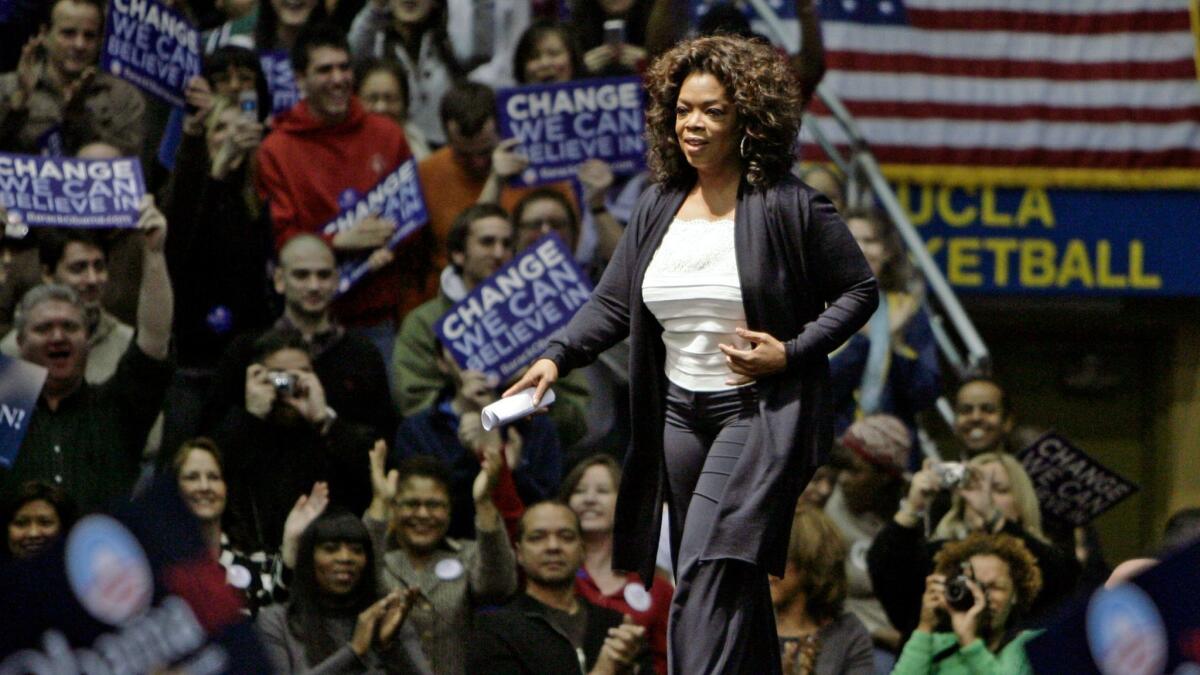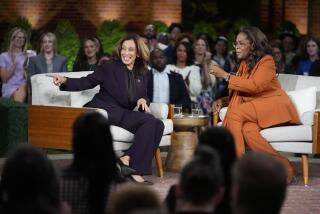Oprah for president in 2020: Will she? Should she?

How does Oprah Winfrey stack up against Donald Trump?
It sounds simple enough: If Donald Trump can win the presidency, why couldn’t Oprah Winfrey?
A day after her rousing speech on the #MeToo movement at Sunday’s Golden Globe Awards, a Winfrey 2020 boomlet suddenly dominated American politics.
The idea of a television talk show host, even one as popular as Winfrey, making a viable run for the White House would have struck many as absurd not long ago.
Not so in the era of Trump.
The chatter about Winfrey did, however, spark debate on the paramount role of fame in a presidential campaign.
“Oprah gave one of the best political speeches since Obama left the stage, but does that mean America’s longing for another celebrity novice?” asked Rose Kapolczynski, a Democratic campaign consultant in Los Angeles.
“Is it good for democracy if 100% name ID and one good speech make you the presidential front-runner?”
Good or bad, it’s all but inevitable that a famous candidate would dominate a race.
“The name of the game in elections is name recognition, and you get that from celebrity,” said Martin Kaplan, a USC professor who specializes in the impact of media and entertainment on society.
Pundits quickly started handicapping Winfrey’s odds, starting with a scramble for the Democratic nomination.
Winfrey, 63, is younger than some of the top Democrats who might run, William Kristol, editor of the conservative Weekly Standard magazine, told followers on Twitter.
“Sounder on economics than Bernie Sanders, understands Middle America better than Elizabeth Warren, less touchy-feely than Joe Biden, more pleasant than Andrew Cuomo, more charismatic than John Hickenlooper,” he wrote.
Winfrey meets all three constitutional tests to run for president: She’s over 35 years old, she’s a U.S. citizen born in the United States, and she has lived here for more than 14 years.
Her wealth would be an enormous asset, just as Trump’s was. Winfrey’s net worth is $2.8 billion, according to Forbes.

But much of the Oprah 2020 chatter ignores the hard realities of running for president, even for one of the nation’s best-known celebrities.
“You have to want to do it, because it’s an enormous challenge, an enormous trial, an enormous test of your soul,” said J. Ann Selzer, an Iowa pollster.
To millions of Americans, Winfrey might seem familiar after decades appearing on TV, acting in Hollywood movies and reporting now as a special correspondent on CBS’ “60 Minutes.”
But presidential candidates face a vetting far more invasive than anything Winfrey has ever endured.
Beyond the news media’s scrutiny of her personal and professional life, opponents — including a large field of Democrats — would compile dossiers on her past, timing the release of embarrassing details to inflict maximum damage.
“My experience with celebrities is they’re enamored with the talk and with the thought of being president or governor or what have you, but when they step up to the line and they understand the scrutiny they have to go through … they back away,” said John Weaver, a top strategist in the presidential campaigns of Sen. John McCain of Arizona and Ohio Gov. John Kasich, both Republicans.
Weaver also questioned whether voters would see a “campaign run out of Bel-Air” as a suitable antidote to Trump’s disruptive presidency.
Winfrey’s candidacy would indeed defy the historical pattern of voters picking presidents they expect to correct a predecessor’s flaws, said Katie Merrill, a Democratic strategist in the San Francisco Bay Area. One of the starker examples: President Carter, widely seen as weak, was ousted by tough-talking Ronald Reagan.
“I think it is far more likely that the American public will go to the opposite of the current occupant of the White House,” picking a traditional elected official seasoned in public policymaking — not another celebrity outsider, she said.
Winfrey, who supported Barack Obama and Hillary Clinton for president, has shot down past speculation that she might run.
“There will be no running for office of any kind for me,” she told her best friend, Gayle King, in October on “CBS This Morning.”
But after Winfrey’s Golden Globes speech Sunday on the national upheaval over sexual harassment, her longtime partner, Stedman Graham, told The Times: “It’s up to the people. She would absolutely do it.”
It would not be easy. Thousands of hours of video, some never seen by the public, would instantly become fodder for attacks.
In the context of a campaign, little-noticed banter from years ago can turn toxic.
Trump once told radio shock jock Howard Stern that he enjoyed seeing naked women backstage at his beauty pageants.
He also told Stern that he backed President George W. Bush’s invasion of Iraq, a statement he later denied making despite the audio evidence.
And Trump’s campaign nearly collapsed when a recording surfaced of him telling “Access Hollywood” anchor Billy Bush that he got away with sexually assaulting women because he was famous.
In the end, Winfrey’s fame could well help her weather controversies, just as it did for action movie superstar Arnold Schwarzenegger when, days before he was elected governor of California, multiple women accused him of groping.
“At a certain point, celebrities become transcendent,” said political scientist Ross Baker of Rutgers University. “People are just blinded by the glitter.”
Some Hollywood stars, including Meryl Streep and Sarah Silverman, called on Winfrey to run, but public enthusiasm is no sure thing. A Quinnipiac University poll last March found 52% of voters viewed Winfrey favorably, but 69% said she should not run for president in 2020.
Winfrey, who lives in a mansion in Montecito, Calif., would inevitably be pegged by Republicans as a Hollywood elitist. On Monday, the attacks were swift.
Mocking Winfrey online, some conservatives posted photos of her at glitzy banquets with former movie producer Harvey Weinstein, who was disgraced by the multiple allegations of sexual abuse against women that helped set off the #MeToo movement.
Twitter: @finneganLAT
UPDATES:
9:13 p.m.: This story was updated with additional details and quotes throughout.
6:35 p.m.: This story was updated with context and a quote.
This article was originally published at 1:35 p.m.
More to Read
Get the L.A. Times Politics newsletter
Deeply reported insights into legislation, politics and policy from Sacramento, Washington and beyond. In your inbox three times per week.
You may occasionally receive promotional content from the Los Angeles Times.











